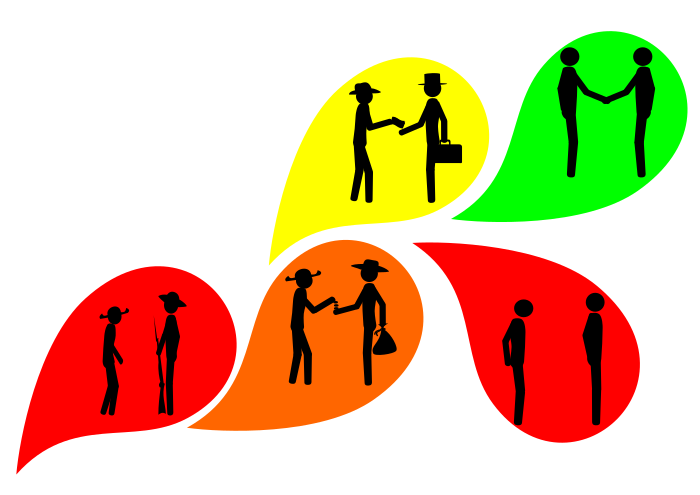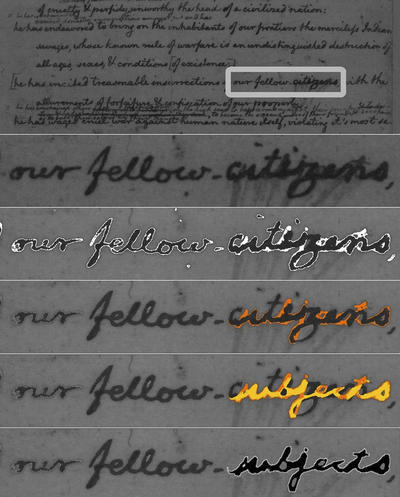
Subjects, Clients, Customers… or Citizens? (Words Matter)
Below are the results of a scientific analysis of Thomas Jefferson’s draft of The American Declaration of Independence. It shows the word ‘subjects’ being replaced with the word, citizen. It proved to be a meaningful edit, since a subject has allegiance (forced or otherwise to a Monarchy), while a citizen has an allegiance to fellow citizens. It not alone in marked the beginning of democracy in America, as the door closed on being subjects of the Monarchy. The Declaration of Independence also sought to foreclose on the potential return of a Monarch ever having sovereignty over the collective inventiveness of the American (demos) peoples. Instead it declared the citizens to be sovereign (Kratia).
Demos means ‘by the people’ and kratia means ‘power’, when joined the two words make Demokratia, the Greek for democracy, which meant – at least for some – the people hold the power and they are the direct rulers.

Credit: Library of Congress, Manuscript Division.
Subject
The framers of the American Constitution also settled for representative democracy, narrowly defined by today’s standards. Whilst they excluded significant swathes of the population on the road to a ‘more perfect union’, suffice to say when Jefferson referred to someone as a citizen he viewed them as a primary inventor of a better tomorrow, and at the centre of democracy.
Client
In the 1940’s, post the New Deal (1942) introduced by Franklin D. Roosevelt, a third word entered the popular lexicon, namely, client.
The word client, in the late 14th Century meant “one who lives under the patronage of another.” It’s Latin derivative, clientem meant: follower or retainer. It is also linked to the Latin word clinare “to lean”, as in to lean on another for protection. As words go it is steeped in a long history of paternalism and patronizing power relations, literally and etymologically.
While its modern usage typically intends far more positive and equitable relationships; many, rightly, question the use of the term. To get beyond the issues of power imbalance, that often exists within the professional/client relationship, and in an effort to be progressive some helping professions (especially those working in the Voluntary Housing sector) have taken to using “customer” as an alternative.
Their intention is to highlight that the people they serve should have a right to the same quality; standards of service and level of choice as those who have greater purchasing power. While I understand those good intentions, I’m concerned by how often this kindly impulse is driven more by sympathy rather than empathy, and therefore lacks authenticity. Because, an authentic customer has real choices, they can for example take their money, if they are not happy with the service they are receiving, and go to another vendor. However, those in receipt of social housing, except in very rare circumstances, cannot.
There’s another limitation to the term customer, which is that it solely defines the person in terms of what they as an individual purchase and how they relate to the goods and services they customarily consume. This is not bad (or good) per se, just limiting if what you want is to promote interdependence, economic sovereignty and a greater sense of citizenship. Referring to people simply by what they personally consume, inadvertently demeans, or at least overshadows, their indigenous relationships.
Citizen
And so, we turn to the term, citizen. Which is to say: Gotong Ryong (an Indonesian term meaning to give to your neighbour with no expectation of return), Garaiocht which emerges from deep Celtic (Irish) traditions meaning deep proximity; faithful to shared productivity, culture and connected into human and environmental encounter.
The meaning of the term citizen, is far more expansive than voting (which often is no more than an act of handing your power over to another), or holding a passport. There are people who have neither, relative to where they reside, but do more to build community connection than those who can trace their ancestral roots to foundations of their nation State.
MU: Re-ask the Question
Peter Block notes that questions bring us together, and answers drive us apart. That is so true! However, some questions also drive us apart, such as: “have you a passport?”, “you’re not from around here, are you?”
In Robert Pirsig’s landmark book, Zen and the Art of the Motor Cycle Maintenance (1974), a character invokes the Buddhist word ‘Mu’, which requests that a person asking the question that bruises you can be asked to un-ask the question and reweave a new one, one with the potential to heal or at least that might enable us to be better at being human together.
In the final analysis, perhaps the words (subject, client, consumer and citizen) used are less important, than the power to call for Mu. Can the people you serve say Mu to your organisation? Though it has to be said, if they can do so with their ‘choices and sense of control’ remaining intact, they are certainly not acting as subjects. In fact, I believe – especially if they are also thinking of the wellbeing of their community – they are living into their citizenship. Whilst they will often consume services as do we all, if stepping fully into their citizenship they will never love or be enthrall to the things they use, and they will never use up the things they love.
This is the basis on which we shift the current narrative which has been authored by a predatory economy, with its obsession on mass production and addictive consumption, towards the production of mass wellbeing, with choice and collective power at its core.
If you’re keen on joining a movement towards citizenship for all, I can highly recommend the Citizen Network – For a world where everyone matters.
Cormac Russell

jane Pightling
Lovely blog Cormac. I hope I demonstrate my experience and not just my age when I observe that changes in language seem to demonstrate or promote (maybe a bit of both) a change in thinking, attitudes and behaviour. I’m thinking about my work in mental health where language evolved from patient/client to service user to citizen. As each of these evolutions occurred there was a confusion and often heated debate. I think this is also an important part of the process and is about us wrestling with the challenges in order to reach the next iteration. Here’s hoping for some lively conversation!
Sylvana Mahmic
Thank you for a thought provoking article which is timely as we wrestle with this in our organization within the context of choice and control under the Australian Ndis. Our families who have young children with disabilities are now indeed customers as their funds are portable. Yet as you describe this term doesn’t embrace the sense of community and peer network we are working hard to engineer, which we believe is a necessary and powerful support that is complimentary to formal services. I like the term citizen for these reasons but introducing this to young families practically speaking is challenging.